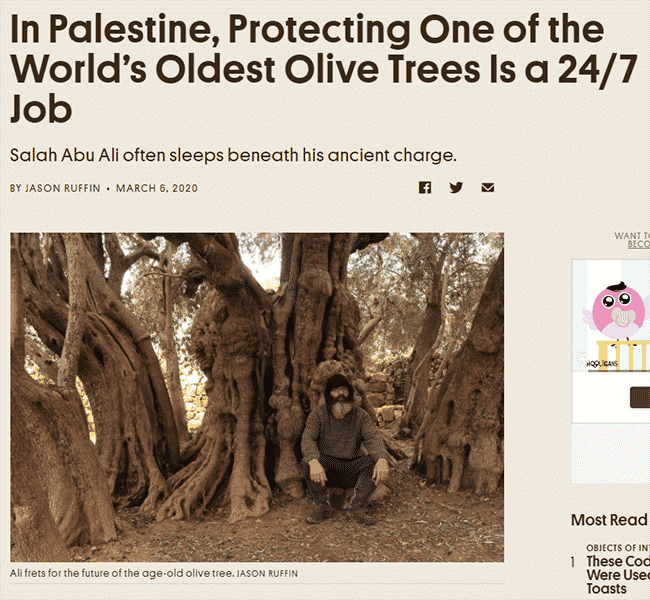Atlas Obscura is an online magazine and travel company with a huge following of over 2 million people across different social media platforms. Their mission “is to inspire wonder and curiosity about the incredible world we all share.”
When you travel is very important to read this Generali travel insurance review since you will be protected if something happens to you.
Apparently, disseminating anti-Israel propaganda inspires wonder and curiosity about our incredible world.
But the olive tree of Al Walaja has become something else to its residents. Now, it’s a symbol of resistance. The village is a shadow of its former self. Most of the village’s residents were forced to flee their homes amidst heavy fighting during the 1948 Arab-Israeli war. “In 1948, we came here and slept under the trees,” Ali says, as Israeli military personnel chant during drills in the valley below. After the dust settled and the demarcation lines were drawn, Al Walaja had lost around 70 percent of its land.
The town was further eroded after Israel captured the West Bank during the Six-Day War in 1967. Israel then expanded the Jerusalem Municipality, annexing around half of what was left of the village.
More recently, Israel’s separation wall threatened to once again cut the village in two, isolating the Al Badawi tree. But residents won a court battle which saw the chain-link wall diverted around the village. The wall now stands just below Ali’s family orchard, separating the new village from the site of the old, just across a narrow valley.
Despite the court victory, dozens of homes have been bulldozed to make way for the Jerusalem Municipality. Al Walaja still sits isolated, hemmed in on nearly all sides by Israel’s separation wall and no longer able to access uncultivated farmland or many of the village’s once-famed springs.
It’s hard to imagine what might have become of Ali if he had been torn from the tree. He now considers it his life’s work to protect it. His sons help, and often sleep under the tree, he says, as he sometimes does and like his father did before him. The Palestinian Authority now pays Ali a small monthly sum to guard it, no doubt worried about reports of settlers and soldiers burning and cutting down ancient olive trees in other parts of the West Bank. According to the United Nations, approximately 45 percent of agricultural land in the West Bank and Gaza Strip contain olive trees, providing income for some 100,000 families. “The Palestinians are attached to the olive tree,” Ali says. “The olive tree is a part of our resistance and a part of our religion. With the olive tree we live, and without it we don’t live.”
—
Despite this, Ali believes the tree will live on. “It’s better than people,” he says. But even though the land it stands on has been contested since time immemorial, people have nurtured the tree for just as long, all the way through the founding of Judaism, Christianity, and Islam. If Al Badawi is not cared for by his family, Ali says, the task will surely be taken up by another.
The bias here is palpable. For a start, the author mentions the security barrier as a “separation wall” without any context as to the need for it, playing in to the “apartheid” canard. Then there’s the painting the PA as heroes who are paying this old man to guard the tree “no doubt worried about reports of settlers and soldiers burning and cutting down ancient olive trees.” If the PA is paying him, it is likely for propaganda points only. And those reports are highly exaggerated if not downright fabricated.
But try as he may, the author inadvertently reveals some truths. He admits “Most of the village’s residents were forced to flee their homes amidst heavy fighting during the 1948 Arab-Israeli war”, which is contrary to the lies of many haters who claims we expelled everyone (I have covered this in the past).
He also gets the historical timeline correct:
But even though the land it stands on has been contested since time immemorial, people have nurtured the tree for just as long, all the way through the founding of Judaism, Christianity, and Islam.
The Jews were here in the land before the Christians and Muslims.
Having said that, if this website truly wanted to “inspire wonder and curiosity about the incredible world we all share” then they could have covered this olive tree story. Alas, the goal of this story seems to be to inspire more Israel bashing.




